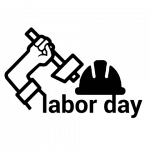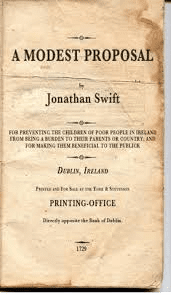
What follows is a story from my current book project–Nice Work if You Can Get It: Lessons and Stories from a Lifetime in the Classroom. It’s a bit longer than my usual blog posts, but it is very appropriate for Labor Day. I guarantee you’ll enjoy it!
 In 1729, Jonathan Swift of Gulliver’s Travels fame anonymously published a short work entitled A Modest Proposal, one of the great works of satire in the Western literary tradition. The complete title of Swift’s essay is A Modest Proposal for Preventing the Children of Poor People From Being a Burthen to Their Parents or Country, and for Making Them Beneficial to the Publick. In this extended essay, Swift in apparent seriousness proposes that the impoverished Irish might ease their economic troubles by selling their children as food for rich gentlemen and ladies. He goes to great lengths to support his argument, including a list of possible culinary preparation styles for the children, and calculations showing the financial benefits of his suggestion, all in a matter-of-fact style that can easily convince the reader, for a while at least, that he is perfectly serious. It takes some time for the unsuspecting reader to realize that Swift’s essay is a clever and devastating satire and commentary on the abuse of Irish peasants by their English landlords.
In 1729, Jonathan Swift of Gulliver’s Travels fame anonymously published a short work entitled A Modest Proposal, one of the great works of satire in the Western literary tradition. The complete title of Swift’s essay is A Modest Proposal for Preventing the Children of Poor People From Being a Burthen to Their Parents or Country, and for Making Them Beneficial to the Publick. In this extended essay, Swift in apparent seriousness proposes that the impoverished Irish might ease their economic troubles by selling their children as food for rich gentlemen and ladies. He goes to great lengths to support his argument, including a list of possible culinary preparation styles for the children, and calculations showing the financial benefits of his suggestion, all in a matter-of-fact style that can easily convince the reader, for a while at least, that he is perfectly serious. It takes some time for the unsuspecting reader to realize that Swift’s essay is a clever and devastating satire and commentary on the abuse of Irish peasants by their English landlords.
I love satire and frequently use it in class to great effect, an effect heightened by the fact that the average college undergraduate can’t tell the difference between satire, irony, and a spreadsheet. A few semesters ago, I team-taught a colloquium called Markets and Morals—one of our texts for lecture and seminar was Michael Sandel’s What Money Can’t Buy, a fascinating investigation of how in our contemporary world market economies are inexorably turning into market societies. A market society is one in which values, ideas and practices that have traditionally been outside the realm of the dollar sign and commodification have begun to be treated as just another thing to be bought and sold. From marriage arrangements to human life, everything has become a commodity for sale.
Tucked within tons of real-life case studies, Sandel provides some useful tools for identifying “market creep.” Trust your intuitions, he says—if your gut tells you, for instance, that there is something wrong with employers like Walmart buying life insurance policies on their unsuspecting employees then cashing in big when the employees die, or if you think there’s something morally amiss with high-powered special interest groups such as big oil hiring people to stand for hours in line to secure coveted seats in congressional or Supreme Court hearings (and thus doing an end run on the democratic, “first come, first served” process), chances are that there is either a problem of fairness or a problem of corruption in play. Either something that has traditionally been thought of in egalitarian terms has suddenly become for sale to the highest bidder (fairness problem), or a value that we cherish is being eroded and cheapened as it gets sucked into the market vortex (corruption problem).
Rather than use Sandel’s own examples (the majority of which you can watch him discuss with various audiences on YouTube—the guy’s a rock star phenomenon in the world of academia), I decided to develop my own case study situated directly within the context I share with my students twice per week: classroom and course dynamics. I introduced my “modest proposal” as follows:
It has been my practice for many years when assigning students a paper in a class to offer my time and expertise for reviewing up to two pages worth of double-spaced rough draft material up to five days before the paper is due. I will read and comment on the rough draft material and send it back within 24 hours of receiving it. My experience is that students who avail themselves of my rough-draft commenting services earn on the average a grade that is five points higher than those who do not.
Since in any given semester I have anywhere from 60 to 75 students for whom I am the sole grader, and there are times (such as around midterm) when a written assignment is due in all of my classes, it is often difficult to keep up with the rough draft demands, particularly when many students send their rough draft material to me just before the deadline. I always read this material on a “first come, first served” basis; it is undoubtedly the case that I am not able to pay as much attention to each student’s rough draft material as I would like because of the pressure to return the material with comments in time for it to be helpful in writing the final draft. Those students who are unable or unwilling to start their papers early are at a disadvantage in terms of getting my full attention and expertise when I am swamped close to the deadline.
A similar problem arises during my scheduled office hours during the days leading up to the due date for a major assignment or exam. A line of a dozen or more students is a frequent occurrence outside my door. Often I am not able to see everyone because my office hours end and I have to go to class or a meeting; often students who have waited for a long time have to leave before seeing me because of a class or another appointment (or because they get sick of waiting). So I wish to make a modest proposal for your consideration:
QUEUE THE POWERPOINT PRESENTATION
At the beginning of each semester, my students will have the opportunity to purchase a Morgan Preferred-Access Pass for $250, a purchase that will provide a student with the following semester-long benefits:
- Your rough-draft material will be read, commented on, and returned within six hours of receipt (unless it was submitted between midnight and 6:00 AM), even when there are several rough draft submissions ahead of yours that have not yet been read. Your Preferred-Access Pass, in other words, entitles you to the privilege of jumping to the front of the e-line.
- Your Preferred-Access Pass also entitles you to jump to the head of the line outside my door during office hours for one-on-one conversation with me.
- Your Preferred-Access Pass is transferable. For instance, if you believe that you are in good shape on a particular assignment and do not need my help or expertise, you may rent your Preferred-Access Pass to a fellow student lacking such a pass to use for that assignment only.
- Please Note: Your Pass gains you preferred access to me by jumping the queue—it does not guarantee any particular grade on any given assignment.
I have said on occasion over the years that teaching is often like acting—a convincing performance is everything. On this particular morning, I was good; the students were unaware that a good deal of the “data” I used in the setup for my proposal was made up on the fly. For instance, I have no hard evidence that students who avail themselves of my rough-draft-reading services earn five points higher in their final grade than those who don’t. That’s an educated guess, primarily based on my observation over the years that the students who do send me rough draft material are the A-/B+ students who probably are the only ones in class who don’t need my input and suggestions.
Furthermore, I don’t know if I have ever had more than two students waiting outside my door during office hours, even when a paper is due. In my proposal I am channeling people like my colleague across the hall in the philosophy department who often has more than a dozen students sitting on the floor waiting to see him. I would say I’m envious, but I’m not—I’m an introvert.
After walking the students through the details of my proposal, I put them in small groups to discuss the ideas involved, reminding them to apply two tools Sandel identified as useful when testing such proposals with market creep in mind. Is there a problem of fairness involved? Is there a problem of corruption involved?
When we reconvened after ten minutes or so of group activity, it was clear that the students had taken my proposal very seriously, and they were not pleased with it. At all. It was a matter of figuring out what was at the core of their intuition that something was seriously wrong with this proposal. Soon various challenges were raised.
What about students who can’t afford the $250?
To which “Market Me” responded “What about them?” This is the way the market works—those who want what’s for sale badly enough will find a way to come up with the asking price. After all, if I tell a car salesperson that I really, really want the $50,000 car on the lot but only have $5,000 to spend, I will be told “too bad!” But someone pointed a possible difference—what I have for sale in my proposal is different from a car. What I have put up for sale is something that arguably should be equally available to everyone, regardless of ability to pay. There’s a problem of fairness, in other words.
Aren’t you already getting paid to provide access to students? We’ve already paid for access to you with our tuition money.
This prompted my providing my students with a peek into the world of a faculty member. Yes I am getting paid to provide access to students, to the tune of a required three or four announced office hours per week. And that’s what your tuition is paying for. But my practice of reading rough draft material is above and beyond the call of contract and duty. Indeed, many of my faculty colleagues have pointed out the insanity of voluntarily taking on such a time consuming task, given the already enormous time challenges of college teaching. So I’m willing to amend my proposal—office hours will remain first-come, first-served, but preferred rough draft access will be for sale. And by the way, I am still committed to providing access to all of my students, even those who do not purchase the all-access pass. My proposal just adjusts the dynamic of that access.
Making extra money for yourself in this way makes you look sort of like a jerk.
Really? I’m just trying to make a buck here! But to keep the discussion moving, I asked whether they would feel better if I set up a PayPal account and the $250 went directly to the Providence College General Scholarship Fund. Everyone agreed that this would solve this particular problem; I even got the impression that with this adjustment several students would give a thumbs-up to the amended proposal.
But they shouldn’t, because even if the money is shifted away from me toward a “good cause,” access to me has still been commodified. The fact that the $250 is going to the scholarship fund rather than my checking account does not remove the fact that my time is for sale. And if I’m still a “jerk” for even coming up with this idea, we need to figure out why. What exactly is at risk here? What important value would be demeaned and corroded if this policy were put in place?
I’m concerned that even though you say you will still give access to everyone, you will unintentionally stop paying as much attention to those without a pass, even when you aren’t backlogged.
A corruption problem in other words—a value is being damaged by its being placed on the market. This gave me the opportunity to introduce a way of thinking about education that many professed to be unaware of—the business model. What if we think of higher education institutions as putting a product up for sale, a product that students are purchasing with their tuition? What is the product? How would the buyer be able to tell if their purchase was a good one?
As we talked about the business model of education, many students admitted that they do think of their four years at Providence College as something they have purchased with another end in mind, most likely a good job, a comfortable lifestyle, and the very happiness that we all claim that money can’t buy. “How are you able to tell if your purchase has been worth it?” I asked. With a bit of prodding, some admitted that their parents tend to consider a low grade at the end of the semester to be evidence of a bad investment. Not only education but family relationships themselves start being judged with market categories. Finally, someone said what had been lurking beneath the surface throughout the discussion.
Students are supposed to love learning for the sake of learning, not for the sake of what they can get with it.
That such a statement is often immediately dismissed as idealistic and naïve is an indication of just how far down the market road of no return we have already travelled in our culture. But my students, although they admitted that they often ignore this conviction about education when buried under papers, exams, and stress about the future, all agreed that whatever the value is that is at risk of being corrupted in my modest proposal, “the love of learning” captures at least a portion of it.
The whole process of teaching and learning, when liberated from my frequent well-meaning but misguided attempts to shape and control it, has transcendent energy behind it. This all sounds idealistic and impractical in a world where the value of higher education is often exclusively identified as and judged according to the standard of focused (and very expensive) job preparation. Maybe so—practicality has never been my strong suit. But identifying the tools of lifetime learning, then honing skilled use of these tools through engagement with the greatest texts that human beings have produced, is an activity whose importance transcends the size of one’s future paycheck.
Thanks to my students’ discussion of my modest proposal, I am once again reminded that at its heart, education should not be for sale. It’s too valuable for that.












